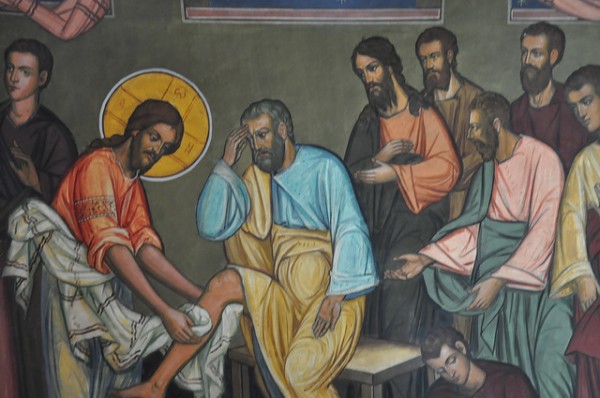An Example of Servant Leadership
When we think of excellent leadership we imagine victory.
- The captain of the army standing at the top of the hill with a sword raised high
- The winning football coach being carried off the field on the shoulders of his players
- The CEO proudly announcing first quarter profits and stock dividends
- The preacher standing in the pulpit with a packed church building and a full offering plate.
- The politician declaring victory on election night.
We do not imagine the washing of feet.
For those of you who go to church or went to church as a kid or had a relative that lived near a church, you know this story.
When the time for Jesus to be crucified approached, he began the process of preparing the disciples to lead what would eventually become the church, teaching hem one of the basic principles of leadership.
Servitude.
Jesus knew that the Father had put him in complete charge of everything, that he came from God and was on his way back to God. So he got up from the supper table, set aside his robe, and put on an apron. Then he poured water into a basin and began to wash the feet of his disciples, drying them with his apron.
-John 13:3-6 (MSG)
The entire church, which now covers the globe, would get it’s start from these men. They would be the means through which this message would spread.
Everything hinged on their success.
Knowing what would be needed, understanding the difficulty of their task, Jesus prepared them through the principle of servant leadership.
1. Power. Jesus’ servitude was given in a context of his power. When God opened his mouth, stars came out. When God spoke, light came into existence. This same God did not lay aside his power, instead, he fully embraced it. We can only truly lay down that which we possess. Serving others in a context of power promotes trust and relationship.
2. Self Awareness. Many of us view serving or being served as an indicator of our status in life. You know that you have arrived when somebody else cleans up your mess. Dirty dishes. Dirty clothes. Dirty feet. Dirty deeds. When Jesus washed feet, he did so knowing exactly who he was. He came from God and he was on his way back. In confidence of his identity, he was fully able to serve in humility. If you are unwilling to serve those you lead, it may indicate a lack of confidence of who you really are.
3. Humility. The act of serving requires us to have a humble view of ourselves. Later the passage tells us that a servant is not greater than his master. Is there really any difference between you and those you lead? We are all human. We all have hopes and dreams, disappointments and failures. As a leader, you have been given the responsibility to lead others down the correct path. Leadership doesn’t make you better, it just makes you more responsible.
4. Getting Dirty. The first thing Jesus did was to set aside his robe. In an age where men wore sandals and walked in the sand, feet got dirty. Not just a little dirty, but hogwash dirty. Jesus was willing to wash despite the filth associated with it. When we lead by serving, we have to be willing to get in the mess and get dirty. It can be unpleasant work, but it must be done. Servitude is messy. If we avoid it, we will never build trust. If we never build trust, our influence will be limited.
5. A Service of Love. It is possible to serve with the wrong motivation. Jesus was not trying to manipulate these men to advance his own cause and fame. His primary motivation was love. He served these men because of how he felt about them. Eventually they did spread his name, but how could they not after experiencing such a great love? Servant leadership focuses on the needs of others, not self. Do you love the people you lead?
6. True Influence. The proof is always in the pudding. Consider what became of these men. Of the 12, seven were eventually executed. They made the ultimate sacrifice so that you and I could experience the realities of the gospel. Jesus had such a strong influence on these men, they were willing to die for him.
This one act of leadership demonstrates to us true leadership. Serving through love.
Soon after this, he did more than just wash dirty feet. He allowed himself to be crucified in service to the entire world so that sin could be forgiven and we could be brought back into relationship with God.
Do you serve those you lead? Tell us your story in the comments.

